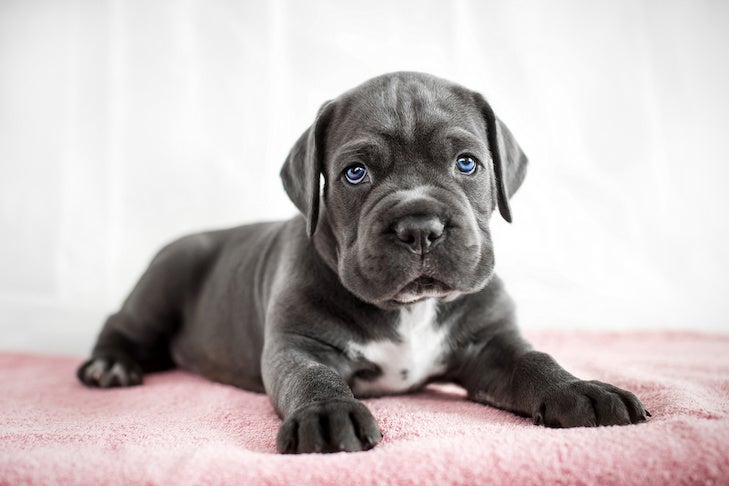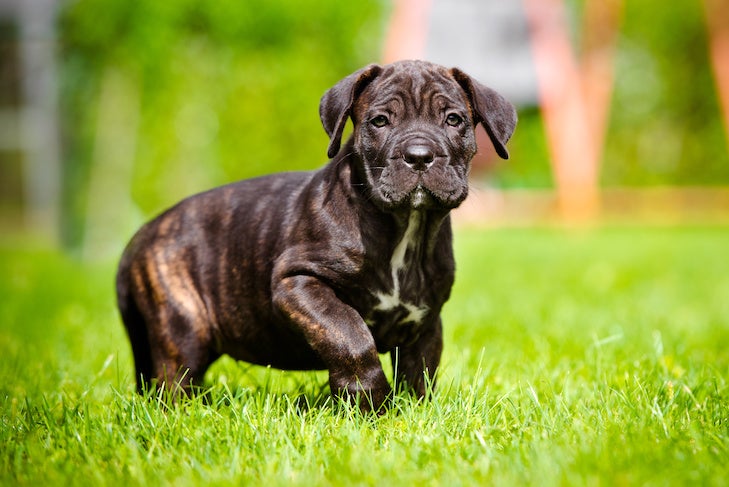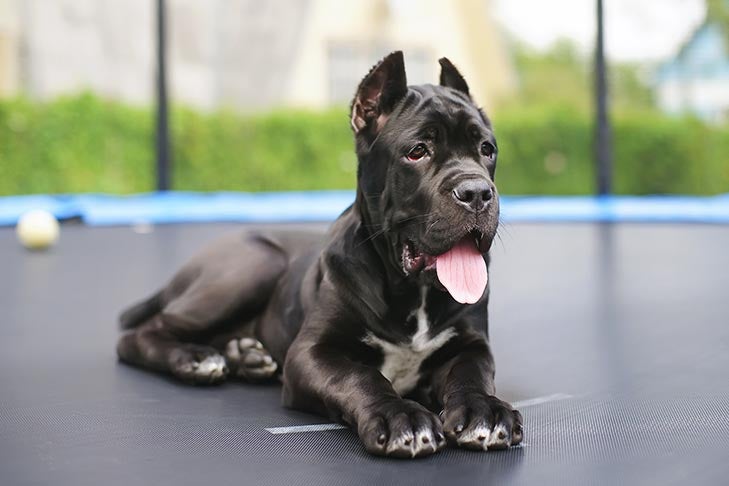Cane Corso puppies melt hearts with their floppy ears, wrinkly bodies, and sweet, squishy faces. But don’t let all that cuteness fool you. Your Corso pup will quickly grow up into a very large and powerful dog, over 100 pounds of strong-willed attitude backed by solid muscle. While this breed can be an extremely loyal and loving companion, they need a lot of socialization and obedience training from a young age to help them grow up to be good citizens and keep them from becoming overbearing and overprotective.
Finding the Best Match
Cane Corsos are a challenging breed and are not generally a good fit for inexperienced dog owners. “They are not for first-time pet [owners],” says Russell Hartstein, dog trainer and behaviorist and owner of Los Angeles-based Fun Paw Care. “They require a solid background in dog training, behavior, the laws of learning and canines, in general, to succeed. It helps if you not only have a lot of dog knowledge but also are strong and fit so that you may play with and interact with a puppy or adolescent Cane Corso.”
Whether you work one-on-one with a professional trainer, enroll your puppy in group classes or take a DIY approach, raising a Corso puppy means spending a lot of time and energy not only on training and socialization but also providing exercise and enrichment to help your pup burn excess energy and help them become more relaxed and compliant. “Ideally, they are getting enrichment via play, exercise, socialization, dog training, behavior modification, and nutrition daily,” says Hartstein.
While Corsos can get along well with kids and other pets if raised alongside them, their size and power when full-grown make them a poor fit for households with very young children or small breed dogs. Older children need to be taught to treat Corsos with respect and not engage in roughhousing or rambunctious play, either with or in front of the dog, and children should always be supervised around this breed. It’s also important that all family members are comfortable and confident around dogs of this size, says the Cane Corso Association of America (CCAA).
If you’re up to the challenge of raising and training a Cane Corso puppy, find a reputable breeder. They will be able to educate you about the temperaments of both the parents and also identify personality traits apparent in each of their puppies to help match you to the pup who will be the best fit for your family and lifestyle.

Cane Corso Puppy Training Timeline
“The age of two weeks to 13 weeks is a sensitive learning period,” says Hartstein. “Research shows that behaviors learned during this time frame have a tendency to stick throughout the puppy’s life more than at any other age. It is therefore critical to put your pup on the path to success and to train, educate, and socialize a puppy within this highly influential time frame.” If all of that sounds overwhelming, don’t worry. A Cane Corso puppy’s basic needs are the same as any other puppy’s. Here is a training timeline to help you know what to focus on at each stage of your puppy’s development throughout the first year.
8 to 16 Weeks:
Bonding With Your Puppy
By eight weeks of age, your puppy is ready to leave their mother and littermates and come live with you. Building a bond with your puppy starts from the moment you pick them up from the breeder. A natural bond will develop as you teach them, feed them and provide for their needs, while activities like playing with your puppy, petting them, training them, and other forms of engagement will help to strengthen a healthy bond that will help your puppy trust you enough to heed your commands. This is especially important when raising a Corso, an assertive breed that often thinks they know what’s best.
Socialization
Ideally, your puppy’s breeder will have already begun the socialization process at around four weeks. A critical socialization window lasts until a puppy is about 16 weeks of age, so it’s important to socialize your Corso pup early and often by introducing them to as many new people, animals, sights, sounds, and experiences as possible during this time frame. The goal is to eliminate a fearful response to new people, animals, or situations that could lead to inappropriate protectiveness or aggression. The best way to do this is through regular and repeated exposure while creating positive associations with treats, praise, and fun.
Crate Training
While it might be tempting to let your Corso pup sleep with you or cuddle on the sofa while they’re little and cute, it’s not the best idea thanks to a dominant streak that can make an overly-coddled Corso entitled and demanding, says the CCAA, which recommends crate training to help your pup understand their proper place in the household. A crate will also provide your pup with a quiet place where they can feel safe to relax and process all of the information they’re absorbing each day. Puppies are much like human children in that they can become overstimulated and need quiet time alone to reset and recharge. It’s best to introduce your puppy to their crate right away and begin building positive associations with food, treats, and toys.

House Training
A crate can also be an invaluable tool when it comes to potty training your pup, allowing you to keep them corralled when you’re not able to supervise them. As soon as you bring your puppy home, introduce them to a designated area in your yard where they can do their business, and then carry or walk them to that area every time you take them out of their crate. Give them treats and praise whenever they go in the correct spot. Since dogs instinctively avoid soiling the same area where they sleep, using a crate will help you get your pup on a manageable schedule.
Grooming and Handling
These early weeks are also a good time to desensitize your pup to being touched and handled in ways they may not like, which can help make future visits to the vet or the groomer go much more smoothly. In addition to getting started early with things like bathing, brushing, nail trimming, and tooth brushing, you should also work on getting your pup to let you inspect their ears, teeth, and paws.
Obedience
Because Cane Corsos are an intelligent and willful breed, obedience training can’t start too soon. The first things you’ll want to teach your puppy are recall — that is, coming to you when you call them — as well as sit and stay, stop, and leave it, all of which are potentially lifesaving commands. Although smart, Corsos aren’t exactly known for being eager to please and they get bored quickly. So keep training sessions short, exciting and fun, reinforcing obedience and desired behavior with high-value treats and lots of praise.

16 Weeks to 6 Months:
Once you’ve laid a solid foundation of socialization, obedience, and building a strong bond with your puppy, the next stage in their development should focus on practicing and reinforcing their obedience skills as well as teaching them impulse control. This is also a good time to start teaching them leash skills and training them to view you as the leader when on walks so they don’t pull you — a common behavior that could get you hurt when dealing with a puppy of this size.
Although the socialization window closes around 16 weeks of age, it’s important to keep socializing your Corso puppy. “You want to socialize your dog to as many kids, men, children, people, and pets as possible to keep them socially lubricated,” says Hartstein. A well-socialized Corso should be aloof and indifferent with strangers and strange dogs. Continued exposure to new people and other dogs will help maintain this attitude and prevent your Corso pup from developing an unhealthy wariness that could lead to aggression.
6 Months to Adulthood:
Although they’ll still have some growing to do, your Corso pup will reach sexual maturity by about six months and enter an adolescent stage during which they may begin testing their boundaries and attempting to assert themselves as the boss. During this stage, it will be important to be firm with your pup and reinforce those boundaries as you continue to practice obedience and refine their response to commands. You’ll also want to continue socialization, and also provide your pup with plenty of daily exercise as well as mental stimulation and enrichment to help keep them calm and relaxed — activities you’ll need to continue throughout your Corso’s lifetime.

